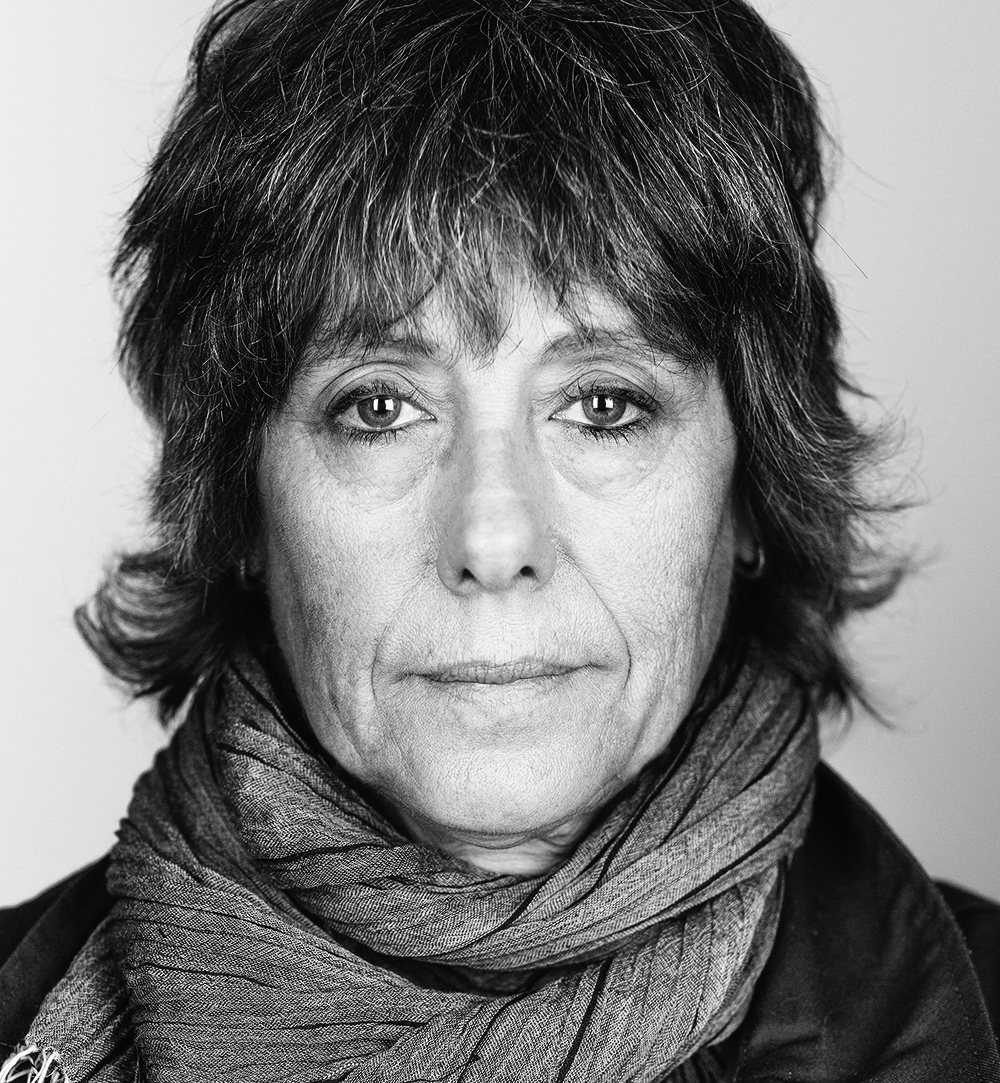We begin with an exploded view because, as years go in South Africa, 2023 was no less of a white-knuckle ride. The crystal ball for 2024 is opaque, however, so don’t unbuckle your seatbelt quite yet.
Container constipation, avian flu, load shedding, water shortages, potholes, disappearing traffic lights, burning buildings, exploding streets, a cholera outbreak, assassinations, royal disputes, mass shootings, kidnappings, illegal mining and fake TikTok doctors.
That’s what we had to deal with in general.
In particular, we were hit with the explosive “Eskom Files”, former CEO André de Ruyter’s sensational revelations in April after his “release” from the ailing, failing electricity provider four months earlier in December 2022.
His book, Truth to Power: My Three Years Inside Eskom, published in May, buckled bookshop shelves and sold like hot amagwinya at a taxi rank.
Fingering Minister of Public Enterprises Pravin Gordhan, claiming both he and national security adviser Sydney Mufamadi were aware that two high-ranking politicians had links to cartels that extract more than R1-billion from Eskom every month, the grey fox was set among the pigeons.
De Ruyter’s allegations brought all the worms out of the woodwork during a subsequent parliamentary inquiry at the Standing Committee on Public Accounts. Let’s just say it was a steaming mess.
Read more in Daily Maverick: Eskom news
On 2 December, Judge Norman Davis, in the Gauteng Division of the High Court in Pretoria, handed down a ruling that the government had breached the Constitution and the human rights of citizens by failing to run Eskom efficiently. De Ruyter was vindicated.
Electricity Minister Kgosientsho Ramokgopa was ordered by the court to ensure “sufficient” energy by January 2024 to prevent the interruption of supply to hospitals, schools and law enforcement. Meanwhile, we roll with the blackouts.
We lift our eyes up to the sun
The fallout from the Eskom debacle kept De Ruyter and Eskom in the headlines, where the utility will remain while private-sector renewable energy provision shoots through the roof – literally.
Solar panel imports from China and elsewhere peaked at R16-billion in the first nine months of 2023. You might have to wait in the new year, though, because as of 2 December, 52 vessels were anchored outside Durban port with a further 25,000-odd containers destined for Pier 2.
All were awaiting offloading.
October 2024 and February 2025 are the dates that new shore and straddle cranes for Pier 2 are expected to be operational. Transnet has a R50-billion backlog in rail and port infrastructure development.
In the meantime, business has provided an economic enema with a freight logistics “road map”, which was drafted by business and the government but still needs Cabinet approval.
Meeting officials in constipated Richards Bay at the end of November, President Cyril Ramaphosa pointed out that the “private sector is going to play a critical role through either concessions or cooperations”.
On 1 December, Minister of Finance Enoch Godongwana unveiled a R47-billion “support package” for Transnet, described as a “guarantee facility”. We are praying it will put a cracker up everyone’s arse.
2024 stumping
With the Constitutional Court confirming the validity of the Electoral Amendment Act on 5 December, individuals and political parties are now poised for lift-off for Election 2024 – the biggest political event since 1994.
Some time between May and August next year, South Africans will go to the polls to vote in what will be the hotly contested seventh general election.
Years of government mismanagement, broken promises and industrial-scale corruption have finally manifested in the real world, with real lives lost in failed insurrections, floods, burning buildings, cholera outbreaks, desperate hunger and large-scale poverty and inequality.
The gatvol levels of ordinary South Africans with established politicians are off the charts.
On 4 November the Constitutional Court ruled that the 200-200 split in the Electoral Amendment Act was constitutional and rational. This means that independent candidates will be contesting only regional votes, with 200 seats reserved for “compensatory” or national votes. These seats will ensure the National Assembly is proportionally representative of elected parties. You’ll work it all out in good time.
Ramaphosa was out on a charm offensive at the end of last month in the killing fields of KwaZulu-Natal, visiting a home to witness a recently installed single outside tap.
EFF leader Julius Malema has already cottoned on to the effective theatre of a red hydraulic crane to physically hoist him above his supporters. We see you, we see you.
“Moonshot” pacts, a “Multi-Party Charter” (MPC) and the exploration of political coalitions are set to dominate the public landscape and debate, with politicians, both known and unknown, singing, dancing and kissing babies and gogos.
Read more in Daily Maverick: People of the Year 2023: The awesome, awful and truly evil
First out of the starting blocks was former FirstRand chair Roger Jardine. Thoughts are that Jardine will run as the presidential candidate for a group of opposition parties.
Senior DA leaders, including lead astronaut John Steenhuisen and Federal Council chair Helen Zille, have had “conversations” with the banker, who has an MSc in radiological physics, is a former activist and was once the country’s youngest director-general.
Funders have pledged a rumoured R1-billion donation. But there is a small matter they will have to navigate – the rules limit private donors, both individuals and entities, to donating no more than R15-million per party per year.
On 4 December, after a meeting of MPC leaders to discuss Jardine, the charter’s joint statement said it was too early to talk about a joint presidential candidate.
They made us proud
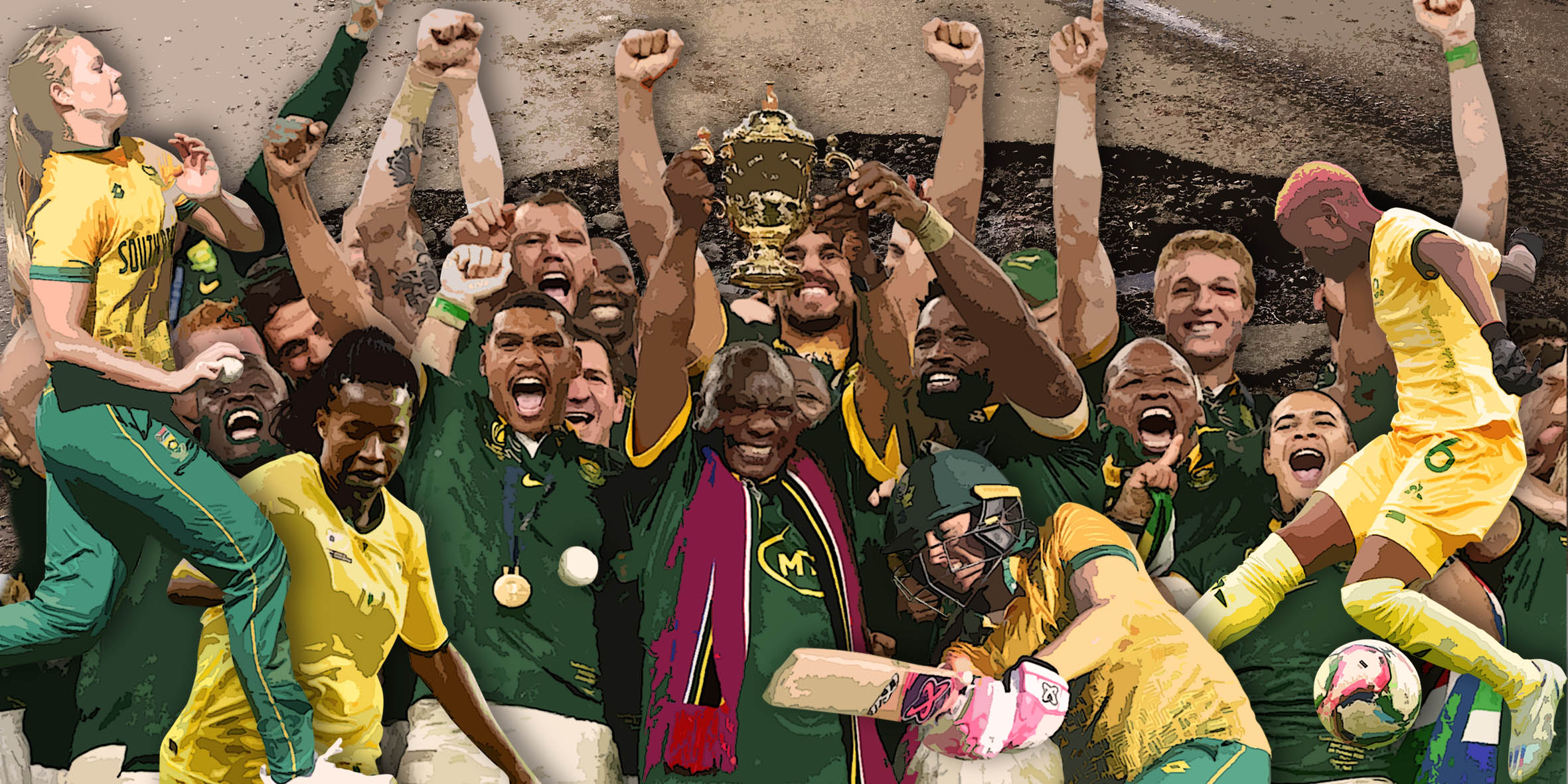 Illustrative Image: Annerie Dercksen of the Proteas. (Photo: Lee Warren / Gallo Images) | Soccer player Jermaine Seoposenwe. (Photo: Ronnie Tippett / Gallo Images) | Springbok captain Siya Kolisi lifts The Webb Ellis Cup with President Cyril Ramaphosa following the Rugby World Cup final victory over New Zealand in Paris on 28 October 2023. (Photo: Dan Mullan / Getty Images) | Sune Luus of the Proteas Women. (Photo: Lee Warren / Gallo Images) | Thubelihle Shamase of Banyana Banyana. (Photo: Sydney Seshibedi /Gallo Images)
Illustrative Image: Annerie Dercksen of the Proteas. (Photo: Lee Warren / Gallo Images) | Soccer player Jermaine Seoposenwe. (Photo: Ronnie Tippett / Gallo Images) | Springbok captain Siya Kolisi lifts The Webb Ellis Cup with President Cyril Ramaphosa following the Rugby World Cup final victory over New Zealand in Paris on 28 October 2023. (Photo: Dan Mullan / Getty Images) | Sune Luus of the Proteas Women. (Photo: Lee Warren / Gallo Images) | Thubelihle Shamase of Banyana Banyana. (Photo: Sydney Seshibedi /Gallo Images)
It wasn’t politicians who made us proud or happy this year – it was our sportswomen and men, our musicians, our poets, our writers, our sheep-shearers and honey-makers who took top international honours.
The one-point Springbok victory against the All Blacks in France in the Rugby World Cup final in Paris was like a balm poured into the weary souls of South Africans. It was a spectacular win, with captain Siya Kolisi and the team catapulted to immortality.
The year was named “The Year of Women in Sport” and by midyear there were growing calls for equal pay, benefits and sponsorships for women athletes.
Banyana Banyana and their coach, Desiree Ellis, may not have won the 2023 Fifa World Cup, but their performance, as the first senior soccer team to reach the knockout stage of a world tournament, was an inspiration to all.
Similarly, the Proteas became the first senior women’s South African team to make an International Cricket Council World Cup final. Despite missing out on qualifying for the semifinals at the Netball World Cup held in Cape Town, the national team gave outstanding performances.
According to Sumayya Khan, deputy director-general in the Department of Sport, Arts and Culture, a draft policy on equal benefits, approved by the Cabinet in March this year, is expected to be passed into law soon.
In August, the President hailed 2023 as a great year for women in sport, but highlighted the “huge disparity between the remuneration of female athletes and their male counterparts. Equal pay for work of equal value is one of the most fundamental tenets of gender equality,” he said.
Up close and local
Joburg
Local government collapse and failure have dominated the headlines this year, with a revolving door of mayors in Joburg, Tshwane and Nelson Mandela Bay in particular. Next year will be more of the same-old-same-old until the elections.
In January, Mpho Phalatse was ousted for the second time as mayor of Joburg before finally resigning from the DA to return to private practice.
By August, as Ferial Haffajee noted, it was just “another day, another chaotic sitting” in the Johannesburg City Council, which at the time had pitted the DA against its new MPC partner, ActionSA.
Joburg is, in some places, a gibbering wreck of a city with stolen traffic lights, exploding streets, waterless suburbs and crime syndicates running amok.
Tshwane
Tshwane Metropolitan Municipality has racked up a debt of about R2-billion to Eskom and had a cholera outbreak in Hammanskraal, caused by an apparent leak from the Rooiwal wastewater treatment plant into drinking water. It is viewed as one of the worst municipalities in the country. So says the Auditor-General.
The parliamentary Select Committee on Cooperative Governance, Traditional Affairs, Water and Sanitation and Human Settlements issued a stiff memo about the City of Tshwane in July.
DA mayor Cilliers Brink, elected in March 2023, has had to deal with the aftermath of years of mismanagement, the cholera outbreak and wage strikes in the capital city.
Nelson Mandela Bay
In Nelson Mandela Bay, city manager Dr Noxolo Nqwazi went to the Gqeberha High Court to get her job back after a suspension during an emergency council meeting in September.
Nqwazi had declared executive mayor Gary van Niekerk, leader of the National Alliance, and his fellow NA councillor Stag Mitchell’s seats in the council to be vacant.
Van Niekerk headed to court confident that he would “still be in charge” after an application to prevent the Electoral Commission of South Africa from removing him. So it goes. Until it won’t.
eThekwini
The Westville Ratepayers Association approached the Durban High Court for an urgent interdict to prevent the eThekwini Municipality from disconnecting residents who were boycotting payment of their property rates and utility bills. Although the association lost the court application, the legal action highlighted for the municipality the mood of ratepayers and potential voters.
In November, the acting senior manager for plants and logistics at eThekwini’s water and sanitation department was murdered at his home near KwaDukuza.
The IFP in KwaZulu-Natal called for the resignation of eThekwini mayor Mxolisi Kaunda over the City’s unspent conditional grant worth R1.5-billion, which was ordered to be returned to National Treasury.
Meanwhile, it has emerged that the municipality dished out R500-million in fraudulent tenders to “businessman” Hlenga Sibisi.
Sibisi is a prior ally of former eThekwini mayor Zandile Gumede and her co-accused in her corruption trial, which has seen her crying personal poverty.
And so it goes. Until it doesn’t any more.
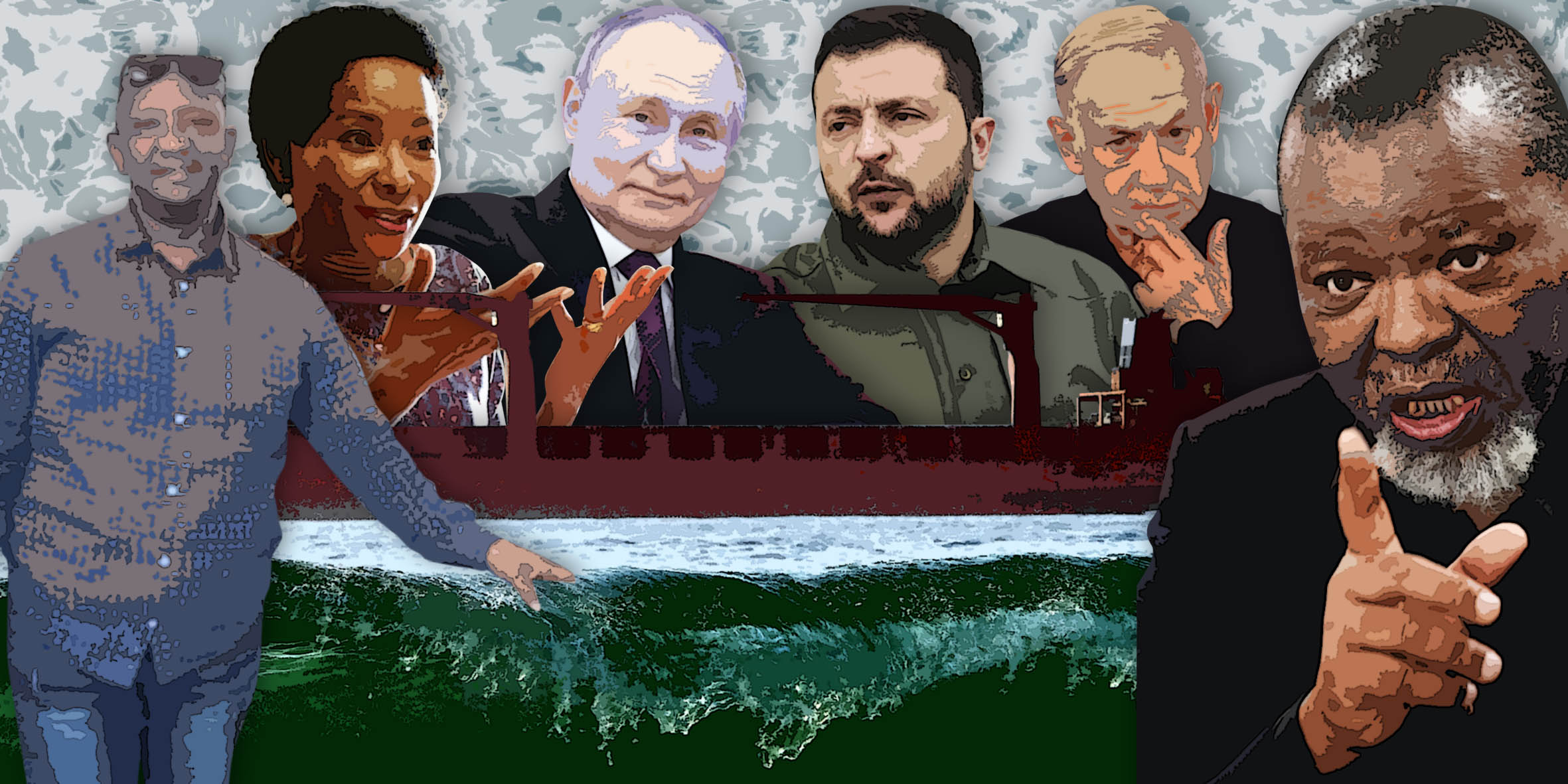 Illustrative Image: From left: University of Fort Hare director of investigations and vetting Isaac Plaatjies. (Photo: @isaacplaatjies3 / X) | Former University of Cape Town vice-chancellor, Professor Mamokgethi Phakeng. (Photo: Gallo Images / Sunday Times / Esa Alexander) | Russian President Vladimir Putin. (Photo: EPA-EFE / Sergei Savostyanov / Sputnik / Kremlin Pool) | Ukrainian President Volodymyr Zelensky. (Photo: EPA-EFE / Julia Nikhinson / Pool) | Israeli Prime Minister Benjamin Netanyahu. (Photo: EPA-EFE / Abir Sultan / Pool) | Minister of Mineral Resources and Energy Gwede Mantashe. (Photo: Gallo Images / Beeld / Deaan Vivier)
Illustrative Image: From left: University of Fort Hare director of investigations and vetting Isaac Plaatjies. (Photo: @isaacplaatjies3 / X) | Former University of Cape Town vice-chancellor, Professor Mamokgethi Phakeng. (Photo: Gallo Images / Sunday Times / Esa Alexander) | Russian President Vladimir Putin. (Photo: EPA-EFE / Sergei Savostyanov / Sputnik / Kremlin Pool) | Ukrainian President Volodymyr Zelensky. (Photo: EPA-EFE / Julia Nikhinson / Pool) | Israeli Prime Minister Benjamin Netanyahu. (Photo: EPA-EFE / Abir Sultan / Pool) | Minister of Mineral Resources and Energy Gwede Mantashe. (Photo: Gallo Images / Beeld / Deaan Vivier)
Higher learning
Institutions of higher learning also dominated the headlines for all the wrong reasons in 2023.
From assassinations at Fort Hare University to the dismissal of University of Cape Town vice-chancellor Mamokgethi Phakeng and attempts by the minister of higher education to place Unisa under administration, it was students who got the short end of the stick.
In October, the CEO of the National Student Financial Aid Scheme (NSFAS), Andile Nongogo, was fired in the heat of a R47-billion payments scandal that left thousands of students who depend on this money homeless and starving.
About 1.1 million students survive on this government aid. More than 87,000 university students could lose funding next year owing to budget cuts.
Things got so bad that the Human Rights Commission has been requested by student William Sezoe, outgoing vice-chairperson of Stellenbosch University’s student representative council, to investigate the shambles.
He has claimed that the “gross and grave human rights violations perpetrated by NSFAS” were brought on by the direct banking system it had opted for.
Shock news arrived in November with the arrest of Fort Hare University vice-chancellor Professor Sakhela Buhlungu’s right-hand man, Isaac Plaatjies, on suspicion of involvement in a series of assassinations and attempted assassinations on campus.
The university has been plagued for ages by revelations of fake degrees and abuse of state money.
Nine other suspects will appear alongside Plaatjies, who was the university’s director of investigations and vetting services. The Special Investigating Unit is probing the university over various allegations of impropriety.
Arrested in April were Bongani Peter, chief operating transport officer, and Wanini Khuza, a retired supervisor of drivers at the university’s East London campus, as well as Sicelo Mbulawa, a former SRC member and businessman who also provided services to the university.
At the start of November, Phakeng, UCT’s controversial celebrity vice-chancellor, was excoriated in a report by an independent panel investigating governance failures at the university.
In February 2023, at the 11th hour, Phakeng jumped before she was pushed, avoiding suspension and arriving at an agreement on a R12-million early retirement package.
Stellenbosch University popped up on the radar when, in June, members of its convocation voted to remove members of its executive committee, including its president, advocate Jan Heunis.
This led to his resignation from the university council, a victory for many pushing for transformation.
The no-confidence motion against the executive committee came after a request that rector and vice-chancellor Wim de Villiers resign in light of accusations of nepotism.
The significance and motivation of Heunis’s axing ran deeper than just a lack of consultation, but had to do with his support for the preferential treatment of Afrikaans at the university.
The result has been hailed as “a step towards positive change”.
NGOs under the bed
Minister of Mineral Resources and Energy Gwede Mantashe went on the warpath against the country’s NGOs this year, accusing civil society and the philanthropists who fund them of having a nefarious agenda.
Mr Coal used public platforms, including his May 2023 budget speech, to attack what he believes is an “anti-development agenda” being kindled by NGOs.
His outbursts came in the slipstream of a successful approach by a group of community organisations from Xolobeni to the Makhanda High Court to stop an imminent seismic survey by Shell and Impact Africa off the Eastern Cape coast.
The threat to NGOs also comes in the form of the General Laws Amendment Act (GLAA), which has been criticised in bill form for its initial excesses and overreach on a compulsory registration requirement.
Writing in Daily Maverick, Nicole Copley, founder of ngoLAW and a member of the NPO Working Group, noted that the GLAA, as of December 2022, affected only organisations identified as “potentially being at risk of being abused for money-laundering and terrorist financing”.
Those seeking to establish themselves in South Africa, including religious institutions, will be subject to mandatory vetting by the State Intelligence Agency.
“There are many theories on what motivates the current ill-conceived (and poorly executed) attack on civil society,” wrote Copley, adding: “One version is that the government is just doing the only thing it seems it can do, which is pass more laws instead of actually, properly and consistently implementing the laws it already has.”
The bill had amounted, she wrote, “to misdirection and scapegoating in an attempt to distract public attention from the criminal activities, nepotism and general bungling that abound at all levels of government by drawing attention to NGOs and religious institutions”.
Foreign affairs
Russian President Vladimir Putin, due to attend the 15th BRICS Summit in Johannesburg in August, opted not to come in the end, avoiding the awkward issue of the International Criminal Court (ICC) warrant for his arrest for war crimes during the invasion of Ukraine.
Apart from that, it was a good summit for Ramaphosa. The five BRICS leaders agreed to invite six new members to join the bloc: Saudi Arabia, the United Arab Emirates, Iran, Ethiopia, Egypt and Argentina.
In June, Ramaphosa flew a “peace mission” to Ukraine and Russia, representing African heads of state and presenting a plan to end the war.
He met both Putin and Ukrainian President Volodymyr Zelensky on a mission that also reflected global power shifts.
All this, however, was wiped off the media map as the Hamas-Israel war in Gaza sent shockwaves through the world.
The continued death of great numbers of Palestinians, thousands of them children, in the retaliatory bombings has led to calls for Israeli President Benjamin Netanyahu to be added to the ICC “wanted” list.
In November, the Department of International Relations and Cooperation démarched the Israeli ambassador to South Africa, Eliav Belotsercovsky, “to discuss the ambassador’s recent unfortunate conduct relating to the unfolding, tragic Israel-Palestine war”.
South Africa also recalled our envoy in Tel Aviv. Calls to close the Israeli embassy in the country are also growing.
Meanwhile, South Africa and Russia continued joint business, so to speak. There were the revelations about the Lady R loading “fokol” in Simon’s Town harbour in the dark between 6 and 9 December 2022.
Our relations with the US took an immediate dive when ambassador Reuben Brigety told journalists in May that he was “confident” that weapons and ammunition had been loaded on to the cargo vessel from Russia, which is under sanctions.
The rand took a dip, with three-year lows against the dollar. The affair also prompted renewed concerns about South Africa’s status under the US’s African Growth and Opportunity Act. There were calls for Brigety’s expulsion.
Russia joined China and South Africa for a joint military exercise with the People’s Liberation Army Navy and Russian Federal Navy in Durban and Richards Bay from 17 to 27 February.
The ship sailed on.
The year ahead
All predictions are that it will be a “back to the future” vibe, with an excitement last seen in 1994 brewing as political parties build their bases and knead potential voters. DM
This story first appeared in our weekly Daily Maverick 168 newspaper, which is available countrywide for R29.
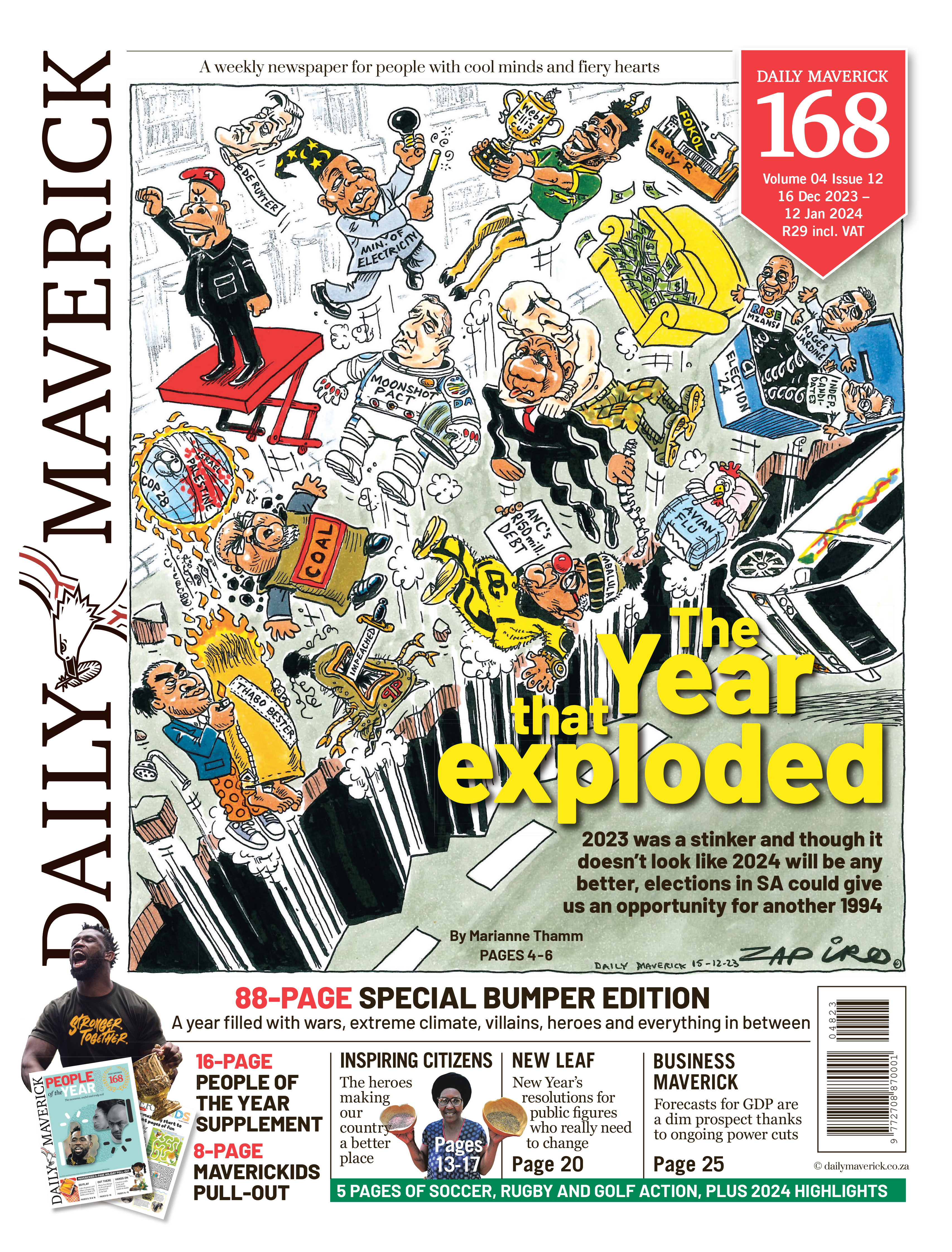




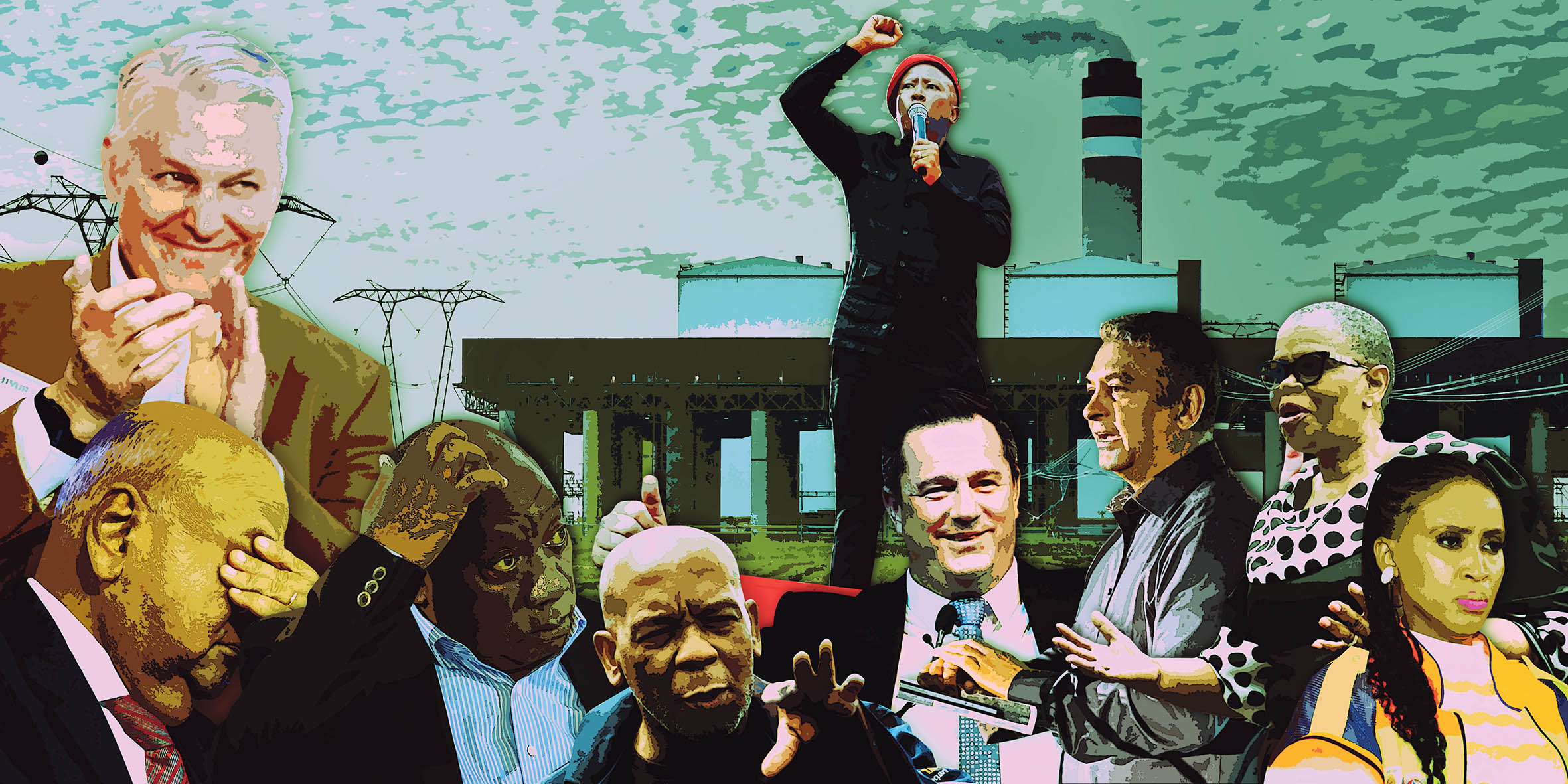 Illustrative Image: From left: University of Fort Hare‘s director of Investigations and vetting Isaac Plaatjies. (Photo: @isaacplaatjies3 / X) | Former University of Cape Town vice-chancellor Professor Mamokgethi Phakeng. (Photo: Gallo Images / Sunday Times / Esa Alexander) | Russian President Vladimir Putin. (Photo: EPA-EFE / Sergei Savostyanov / Sputnik / Kremlin Pool) | Ukrainian President Volodymyr Zelensky. (Photo: EPA-EFE / Julia Nikhinson / Pool) | Israeli Prime Minister Benjamin Netanyahu. (Photo: EPA-EFE / Abir Sultan / Pool) | Minister of Mineral Resources and Energy Gwede Mantashe. (Photo: Gallo Images / Beeld / Deaan Vivier)
Illustrative Image: From left: University of Fort Hare‘s director of Investigations and vetting Isaac Plaatjies. (Photo: @isaacplaatjies3 / X) | Former University of Cape Town vice-chancellor Professor Mamokgethi Phakeng. (Photo: Gallo Images / Sunday Times / Esa Alexander) | Russian President Vladimir Putin. (Photo: EPA-EFE / Sergei Savostyanov / Sputnik / Kremlin Pool) | Ukrainian President Volodymyr Zelensky. (Photo: EPA-EFE / Julia Nikhinson / Pool) | Israeli Prime Minister Benjamin Netanyahu. (Photo: EPA-EFE / Abir Sultan / Pool) | Minister of Mineral Resources and Energy Gwede Mantashe. (Photo: Gallo Images / Beeld / Deaan Vivier) 